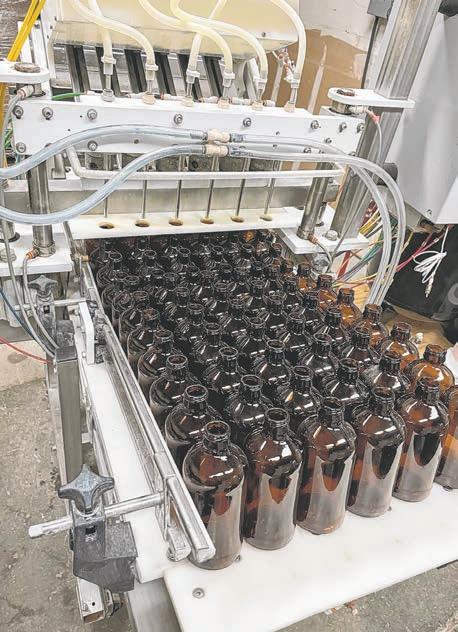












































Parkinson’s disease stands as one of the most complex and challenging neurological disorders, characterized by progressive deterioration of motor functions, cognitive impairment, and various non-motor symptoms. Over the years, research in Parkinson’s disease has witnessed significant advancements, driven by a combination of technological innovations, interdisciplinary collaborations, and a deeper understanding of the underlying molecular mechanisms. Here are some emerging trends and promising avenues in Parkinson’s research.
Recent years have seen remarkable progress in elucidating the genetic factors contributing to Parkinson’s disease. Advances in genomic technologies have identified numerous genetic mutations associated with Parkinson’s, providing valuable insights into disease mechanisms and potential therapeutic targets. Moreover, the advent of precision medicine has paved the way for personalized treatment strategies tailored to individual genetic profiles, offering hope for more effective and targeted therapies.
Mounting evidence suggests that neuroinflammation and dysregulated immune responses play a pivotal role in the pathogenesis of Parkinson’s disease. Researchers are increasingly focusing on understanding the intricate interplay between the central nervous system and the immune system, exploring novel anti-inflammatory and immunomodulatory therapies to alleviate neurodegeneration and neuroinflammation in Parkinson’s.
While current treatments for Parkinson’s disease primarily focus on symptom management, there is growing emphasis on developing disease-modifying therapies that can slow or halt the progression of neurodegeneration. Researchers are investigating various neuroprotective strategies, including neurotrophic factors, protein aggregation inhibitors, and gene therapy approaches, with the aim of preserving dopaminergic

neurons and preserving motor function in Parkinson’s patients.
Early detection of Parkinson’s disease remains a significant challenge, often resulting in delayed diagnosis and suboptimal treatment outcomes. Efforts to identify reliable biomarkers for Parkinson’s have intensified in recent years, leveraging advances in neuroimaging, biofluid analysis, and wearable sensor technologies. The discovery of robust biomarkers holds great promise for facilitating early diagnosis, monitoring disease progression, and evaluating therapeutic interventions in Parkinson’s disease.
Beyond motor impairments, Parkinson’s disease is associated with myriad of non-motor symptoms that significantly impact patients’ quality of life. Research into non-motor manifestations of Parkinson’s, including cognitive dysfunction, sleep disturbances, autonomic dysfunction, and psychiatric symptoms, has gained traction in recent years.
Comprehensive management strategies addressing both motor and non-motor aspects of the disease are essential for improving overall patient outcomes and enhancing quality of life.
Stem cell-based approaches hold immense potential for regenerating damaged dopaminergic neurons
and restoring neuronal function in Parkinson’s disease. Recent advancements in stem cell technology, including induced pluripotent stem cells (iPSCs) and direct reprogramming techniques, offer new avenues for cell replacement therapy and disease modeling. Clinical trials exploring the safety and efficacy of stem cell-derived dopaminergic neurons are underway, heralding a new era in regenerative medicine for Parkinson’s.
Growing evidence suggests that lifestyle factors, including diet, exercise, and social engagement, may influence the risk of developing Parkinson’s disease and modulate disease progression. Researchers are investigating the potential neuroprotective effects of various lifestyle interventions, with a focus on promoting brain health and mitigating risk factors associated with Parkinson’s. Lifestyle-based approaches complement traditional pharmacological therapies and hold promise for preventing or delaying the onset of Parkinson’s disease. Parkinson’s disease research has entered a transformative phase, characterized by rapid advancements and multidisciplinary collaborations. From unraveling the genetic basis of the disease to exploring innovative therapeutic strategies, the landscape of Parkinson’s research is continually evolving. By addressing key challenges such as early diagnosis, disease modification, and personalized treatment approaches, researchers are striving to make meaningful strides towards improving the lives of individuals affected by Parkinson’s disease.

Parkinson’s Awareness Month, observed annually in April, serves as a crucial platform to raise awareness about Parkinson’s disease, a progressive neurological disorder affecting millions worldwide. Throughout the month, various organizations, advocacy groups, healthcare professionals, and individuals affected by Parkinson’s disease come together to educate communities, promote understanding, and support research efforts aimed at finding better treatments and ultimately a cure for the disease.
During Parkinson’s Awareness Month, initiatives range from public awareness campaigns and educational seminars to fundraising events and community outreach activities. These efforts aim to dispel misconceptions surrounding Parkinson’s, highlight the challenges faced by individuals living with the disease, and emphasize the importance of early detection and comprehensive care.
Parkinson’s Awareness Month provides an opportunity for individuals to show solidarity with those affected by Parkinson’s, whether by wearing gray ribbons, participating in local events, or sharing personal stories to foster empathy and understanding. By uniting efforts on a global scale, Parkinson’s Awareness Month plays a crucial role in driving progress towards improved quality of life for individuals living with Parkinson’s disease and their caregivers.
In recent years, research into autism spectrum disorder (ASD) has led to several significant developments, offering new insights into the underlying mechanisms of the condition and potential avenues for intervention and support.
Advances in detection, diagnosis, treatment, intervention and understanding the role of genetics are some of the latest developments in autism research.
Early detection and diagnosis of autism spectrum disorder are crucial for accessing timely interventions and support services. Recent research has focused on improving screening tools and diagnostic methods to identify ASD at younger ages accurately.
One notable development is the refinement of behavioral and developmental screening tools, such as the Modified Checklist for Autism in Toddlers (M-CHAT) and the Early Screening for Autism and Communication Disorders (ESAC). These tools enable healthcare providers to assess early signs of ASD in infants and toddlers, facilitating early intervention and support.
Emerging technologies, such as artificial intelligence (AI) and machine learning algorithms, show promise in enhancing the accuracy and efficiency of autism diagnosis.
These tools analyze behavioral and physiological data to identify patterns associated with ASD, aiding clinicians in making more accurate and timely diagnoses.
Researchers have explored the use of biomarkers, including genetic markers and brain imaging techniques, to improve the diagnostic process for autism. By identifying biological indicators associated with ASD, clinicians can supplement traditional diagnostic assessments, leading to more precise and personalized interventions for individuals with autism.
Effective interventions can significantly improve outcomes for individuals with autism spectrum disorder, enhancing their social communication skills, behavior regulation, and overall quality of life. Recent developments in treatment and intervention approaches have expanded the range of options available for individuals with ASD and their families.
One notable advancement is the growing emphasis on early intervention, with interventions beginning as early as infancy. Early Start Denver Model (ESDM), Applied Behavior Analysis (ABA), and social communication-focused interventions are evidence-based approaches that have shown efficacy in improving outcomes for young children with ASD.
Researchers are investigating innovative
interventions targeting specific domains affected by autism, such as social skills training, sensory integration therapy, and cognitive-behavioral interventions for anxiety and repetitive behaviors. These interventions are often delivered in interdisciplinary settings, involving collaboration between psychologists, speech therapists, occupational therapists, and other professionals.
Advancements in technology have opened new possibilities for delivering interventions remotely, through telehealth platforms and mobile applications. These digital interventions offer accessibility and flexibility for individuals with ASD and their families.
Recent research has deepened our understanding of the genetic and neurobiological underpinnings of autism spectrum disorder, shedding light on its complex etiology and heterogeneity.
Genomic studies identified numerous genetic variants associated with ASD, including rare mutations and common genetic risk factors. These findings have highlighted the role of gene-environment interactions and polygenic inheritance in shaping autism risk and phenotypic variability.
Advances in neuroimaging techniques, such as functional magnetic resonance
imaging (fMRI) and diffusion tensor imaging (DTI), have provided insights into the neural circuits and connectivity patterns underlying ASD. Researchers have observed alterations in brain structure, connectivity, and functional activity in individuals with autism, informing our understanding of the neurodevelopmental trajectories associated with the condition.
Research into the molecular and cellular mechanisms of ASD has revealed dysregulation in various biological processes, including synaptic signaling, immune function, and neuronal connectivity. These findings offer potential targets for pharmacological interventions and personalized treatment approaches tailored to the specific biological profiles of individuals with autism.
The latest developments in autism research have contributed to a deeper understanding of the condition’s complexities and have paved the way for more effective early detection, personalized interventions, and targeted treatments. By continuing to advance our knowledge of autism spectrum disorder, researchers aim to improve outcomes and quality of life for individuals with ASD and their families.











technology and uncompromised dignity, in a bright, ultra-modern setting.









provides:
• I n-Center Chronic Hemodialysis
• Home Dialysis
• Experienced Nephrologists and Dialysis Registered Nurses
• Comfortable, State-of-the-Art, Private Treatment Stations
• Personal TV/DVD and Free Wireless Access
• Homelike Reception Area

• Social Work Services
• Nutrition Counseling
• Individual and Family Health Education
• Stretcher Capability
• Valet Parking and Medical Transportation Available
Start





ombucha has soared in popularity due to its unique taste and purported health benefits. This is not news to Patrick Sullivan, owner of Black Cap Beverage Company in Farmingdale, who has been brewing the fermented tea concoctions for several years now, quietly blazing his path to entrepreneurial success with distribution and several solid business partnerships across Long Island.
“I was home-brewing beer when I was in my 20s,” Sullivan said. “I was a detective in New York City, sitting in a car all day or in front of a computer writing reports, eating fast food; as I got into my 40s I realized that I needed to get back into shape.”













Sullivan also suffers from stomach problems. Getting his weight under control, cutting carbs and generally being healthier was enough for Sullivan to create a better way to enjoy a refreshing carbonated beverage.
“Even though I was counting every calorie, exercising and getting into really good shape, I still liked to have a beer, but beer is full of a lot of calories generally,” Sullivan said. “I found that I could have three bottles of kombucha and it would stil be healthier than one beer.”
He likened kombucha to enjoying a full-bodied beer or wine. Kombucha does have trace amounts of naturally occurring alcohol, but is regulated as a non-alcoholic beverage.
“Kombucha is a great option for local bars and restaurants to serve,” Sullivan said. “It gives people, who do not want to, or cannot drink, a great way to enjoy a bottled beverage while fitting in socially; it satisfies my need for a beer, especially because it has mild, natural carbonation.”
Many people have never heard of kombucha or are misinformed about the beverage and its benefits.
“Long Islanders have not really been exposed to kombucha; they are just starting to learn what it is and look for it in the market,” Sullivan said. “When people hear ‘kombucha’ they want to respond, ‘God bless you” because it just sounds foreign.”
The first sip of kombucha usually surprises the palate; it has a taste that you might have to build up to in order to appreciate.


“When people try kombucha for the first time, I liken it to having your first drink of wine and I ask people, ‘Do you remember when you first had a sip of wine? You probably didn’t like it right away, but now you love it and probably straight from the bottle’,” Sullivan joked.
in probiotics, the beneficial bacteria t hat play an essential role in gut health, improving digestion and boosting immunity. It also contains antioxidants that combat harmful free radicals, reducing inflammation and preventing cell damage. The fermentation process produces acetic acid, which has antimicrobial properties, potentially warding off harmful microorganisms. Research is ongoing, many enthusiasts also report enhanced energy levels and detoxification effects, making kombucha a popular choice for those seeking to improve their overall well-being.
Black Cap Beverage Company offers several flavors, including Big Apple, Bluesberry, Grape Gatsby and Piña Y Coco, that are available for purchase at the brewery warehouse on weekdays between 9 a.m. and 5 p.m., for home delivery, at several farmers markets across Nassau, Suffolk and Queens throughout



the year. Special pricing is available for wholesale and for first responders.
Black Cap Beverage Company is located at 269 Eastern Pkwy #A, in Farmingdale. Visit blackcapbev.com to learn more and to place an order.
ProHEALTH Dental proudly announces a groundbreaking affiliation with Northwell Health.

Northwell is New York State’s largest health care provider, with more than 900 locations. ProHEALTH Dental has a network of 16 state-of-the-art dental offices throughout the NY Metro Area. Together, we will treat patients holistically, focusing on how oral health improves overall health.


Put Your Health
Where Your Mouth Is™ and book an appointment today, call 855-PHD-CARE



Dr. Gerard Vitale announces the relocation of his new state of the art






Specializing in Minimally Invasive Vein Treatments Including:
• Laser & Radiofrequency ablations
• Chemical ablations of large unsightly varicose veins
• Sclerotherapy treatments of spider veins
Over 30 years experience in the diagnosis and treatment of:
• Abdominal Aortic Aneurysms
• Carotid Artery Disease


• Peripheral Artery Disease of the Lower Extremities NEW OFFICE


1 School Street, Suite 205, Glen Cove
(Ample parking in rear)
(516) 759-5559
VitaleVeinAndVascular.com